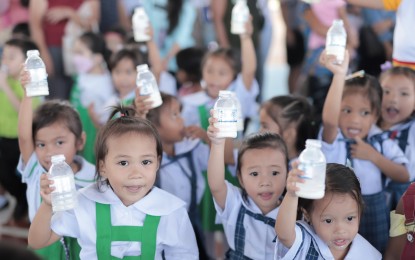
MILK FEEDING PROGRAM. The Department of Agriculture-Philippine Carabao Center (DA-PCC) and its assisted cooperatives will provide 50 percent of the milk requirements for the government's national feeding program in 2024. The remaining 50 percent will be supplied by the assisted cooperatives of the National Dairy Authority. (Photo courtesy of DA-PCC)
CITY OF SAN FERNANDO, Pampanga – The Department of Agriculture-Philippine Carabao Center (DA-PCC) and its assisted cooperatives have vowed more supply for the government’s national milk feeding program.
DA-PCC Officer-in-Charge Executive Director Caro Salces said on Friday 50 percent of the milk requirements for the feeding program will be provided by the DA-PCC and its assisted cooperatives in 2024.
Salces said the remaining 50 percent will be supplied by the assisted cooperatives of the National Dairy Authority (NDA).
“This concerted effort aligns with the DA's objective of providing 100 percent of the requirements for the milk feeding program,” he said in a statement.
Pursuant to Republic Act (RA) 11037 or the Masustansyang Pagkain para sa Batang Pilipino Act, the DA-PCC tapped its assisted cooperatives to supply the demand for the milk feeding program led by the Department of Education and the Department of Social Welfare and Development.
Citing the need for an innovative solution to ensure a consistent supply of milk, the DA-PCC, in partnership with its assisted cooperatives, has turned to retort facilities to bridge the gap in its delivery capabilities.
“We now have existing retort facilities in Isabela, Science City of Muñoz, Batangas, and Sorsogon managed by our partners in the industry. We also have plans to establish similar facilities in Bohol and Zamboanga del Sur to cater to the Visayas and Mindanao areas,” he said.
Retort technology involves using airtight packaging and heat processing to sterilize and preserve milk, extending its shelf life significantly without compromising its nutritional value.
“This method not only ensures the safety and quality of the milk but also allows for bulk transportation to regions where frequent deliveries are impractical,” Salces said.
He said that the reliance on traditional delivery methods has often resulted in delays and inadequate supply, leaving many children without the nutrition they require for healthy growth and development.
Likewise, he said the DA-PCC is planning to establish milk laboratories within its 12 regional centers nationwide, offering cooperative members access to milk quality testing services.
Aside from infrastructure development, Salces said the DA-PCC will implement various measures that include enhancing carabao smallholder farms' productivity through the establishment of a National Dairy Herd Improvement System in partnership with the Korea International Cooperation Agency; improving milk production through an increased number of dairy animals and sufficient feeding; establishing dairy herd buildup through the new cooperative conduit scheme; and carrying out massive artificial insemination activities, among others.
Since 2019, the DA-PCC official said the national milk feeding program has already benefitted over 4.2 million undernourished children in the country.
Likewise, the national milk feeding program provided income to some 53 DA-PCC-assisted cooperatives nationwide with some PHP2 billion in total revenues from 2019 up to the present.
In June 2018, former President Rodrigo Duterte signed RA 11037 to address the problem of undernutrition among Filipino children through a national feeding program of which one of the components is the milk feeding program.
Fresh milk or fresh milk-based products are an additional component to cycle-menu hot meals in the school-based feeding program. (PNA)
